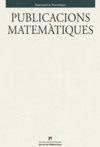非齐次测度的并矢BMO的BMO
IF 1
3区 数学
Q2 MATHEMATICS
引用次数: 3
摘要
通常的三分之一技巧允许将涉及一般立方体的问题简化为可数族。此外,这个覆盖引理只使用了并矢立方体,这使得在调和分析问题中可以使用很好的鞅性质。我们考虑在具有非齐次度量的空间中替代这种技术。这带来了额外的困难,迫使我们考虑非规则的鞅过滤。我们发现的二元覆盖可以用来澄清鞅BMO空间与这种情况下最自然的BMO空间之间的关系,即Tolsa引入的空间RBMO。本文章由计算机程序翻译,如有差异,请以英文原文为准。
BMO from dyadic BMO for nonhomogeneous measures
The usual one third trick allows to reduce problems involving general cubes to a countable family. Moreover, this covering lemma uses only dyadic cubes, which allows to use nice martingale properties in harmonic analysis problems. We consider alternatives to this technique in spaces equipped with nonhomogeneous measures. This entails additional difficulties which forces us to consider martingale filtrations that are not regular. The dyadic covering that we find can be used to clarify the relationship between martingale BMO spaces and the most natural BMO space in this setting, which is the space RBMO introduced by Tolsa.
求助全文
通过发布文献求助,成功后即可免费获取论文全文。
去求助
来源期刊
CiteScore
1.60
自引率
0.00%
发文量
29
审稿时长
>12 weeks
期刊介绍:
Publicacions Matemàtiques is a research mathematical journal published by the Department of Mathematics of the Universitat Autònoma de Barcelona since 1976 (before 1988 named Publicacions de la Secció de Matemàtiques, ISSN: 0210-2978 print, 2014-4369 online). Two issues, constituting a single volume, are published each year. The journal has a large circulation being received by more than two hundred libraries all over the world. It is indexed by Mathematical Reviews, Zentralblatt Math., Science Citation Index, SciSearch®, ISI Alerting Services, COMPUMATH Citation Index®, and it participates in the Euclid Project and JSTOR. Free access is provided to all published papers through the web page.
Publicacions Matemàtiques is a non-profit university journal which gives special attention to the authors during the whole editorial process. In 2019, the average time between the reception of a paper and its publication was twenty-two months, and the average time between the acceptance of a paper and its publication was fifteen months. The journal keeps on receiving a large number of submissions, so the authors should be warned that currently only articles with excellent reports can be accepted.

 求助内容:
求助内容: 应助结果提醒方式:
应助结果提醒方式:


